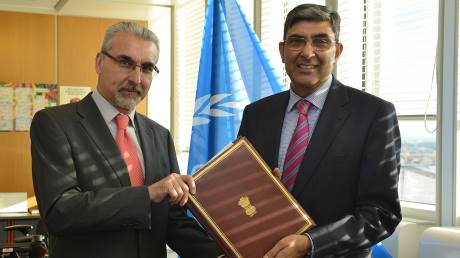India joins nuclear liability convention
05 February 2016
India yesterday deposited its instrument of ratification of the Convention on Supplementary Compensation for Nuclear Damage (CSC) with the International Atomic Energy Agency (IAEA).
 |
| Rajiva Misra delivers the instrument of ratification to Juan Carlos Lentijo (Image: D Calma/IAEA) |
India's permanent representative to the IAEA, Rajiva Mistra, delivered the instrument of ratification to IAEA acting director general Juan Carlos Lentijo, who is also head of the agency's department of nuclear safety and security.
Any nuclear accident has potential consequences beyond the boundaries of the country where it occurs, and national laws on liability in the case of a nuclear accident are supplemented by a number of international conventions. Liability is limited by both international conventions and by national legislation, so that beyond the limit (normally covered by insurance) the state can accept responsibility as insurer of last resort, as in all other aspects of industrial society.
The CSC aims to increase the amount of compensation available in the event of a nuclear incident through public funds made available by its contracting parties on the basis of their installed nuclear capacity and United Nations rate of assessment. It also aims to establish treaty relations among states whether or not they belong to the existing nuclear liability conventions, notably the Vienna Convention on Civil Liability for Nuclear Damage, which entered into force in 1977, and the Paris Convention on Third Party Liability in the Field of Nuclear Energy, which entered into force in 1968. The Vienna and Paris conventions, which have both been amended since first entering into force, were linked by a joint protocol in 1988.
The CSC was adopted in 1997 but could only enter into force after it had been ratified by five states with a minimum of 400 GW (thermal) of installed nuclear capacity. Japan became the fifth such state to ratify the convention in January 2015, and it entered into force 90 days later, on 15 April. India signed the CSC in October 2010. The convention will enter into force for India on 4 May, 90 days after the deposition of the instrument of ratification. So far it has 19 signatories, eight of which have deposited instruments of ratification, acceptance or approval with the IAEA.
India's nuclear liability regime has provided a stumbling block for would-be suppliers. In most countries nuclear plant operators are liable for any damage caused in the event of an accident, against which they take out liability insurance ,but up until 2010 - when the Indian government passed its Civil Liability for Nuclear Damage Act - India had been a notable exception, with reactor suppliers potentially liable for damages in the event of an accident. The 2010 legislation makes Indian operators primarily liable for any nuclear accident, but still keeps open the possibility of recourse to suppliers.
India's Ministry of External Affairs said in a statement that its ratification of the CSC marked a "conclusive step in the addressing of issues related to civil nuclear liability in India".
US energy secretary Ernest Moniz said India's membership of the convention was a "crucial step" towards facilitating the growth of nuclear energy in the country. "I welcome India to the CSC and look forward to their deployment of civil nuclear energy technologies to help provide reliable, low-cost power to millions of Indians. These efforts will help spur a low-carbon economy to combat climate change. Additionally, we are eager to work with India, and all CSC member countries, to facilitate the use of advanced nuclear technologies developed in the United States," he said.
Researched and written
by World Nuclear News